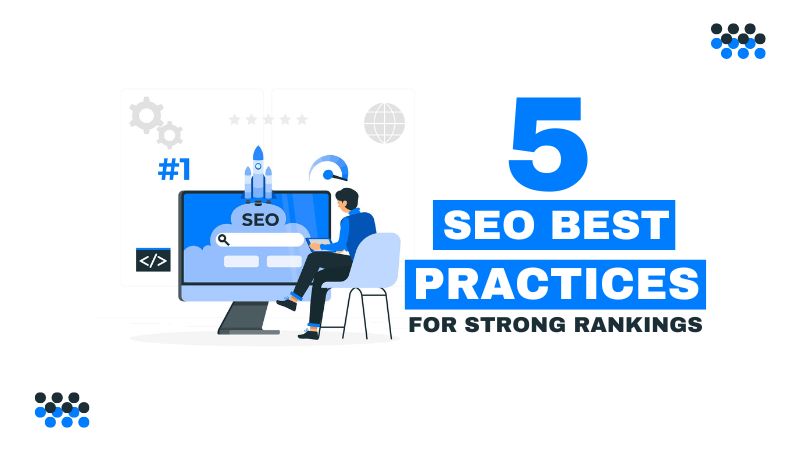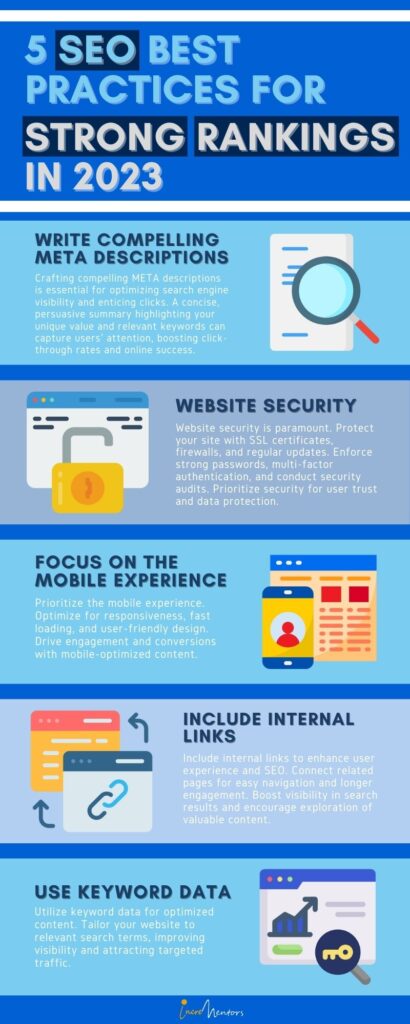
Looking to make the most of your website? Then you should definitely consider the best practices of SEO.
When it comes to the success of any website, search engine optimization is almost always an integral part of that.
If you want brand recognition and visibility, then this is something you do not want to ignore.
SEO, on the surface, may appear quite complicated and difficult to get to grips with, but the reality is that it’s much simpler once you learn the basics. And this is where articles like this come into the equation.
So what are the things you should know when it comes to SEO:
1. Write Compelling META Descriptions
The META description, if you’re unfamiliar with what it is, is that small block of text that features right below your content title in the search engine results page (SERPS).
Similar to the page title, the META description can also be found in the <head> area of your HTML page.
In this small block of text, you’ll want to provide a summary of what the contents of the page are about.
Similar to when constructing your headings, you want to look at things from the perspective of the viewer. What kind of words would encourage you to click on the link?
One thing to keep in mind is that Google is quite fond of altering and rewriting META descriptions.
After a quick analysis of your content has been undertaken, they will look at it and attempt to describe it in a way that makes it more relevant to the search terms they intend to rank it on.
In some cases, they may just use the text in your META description, whereas in other cases, they’ll take some words from the content and rejig it in a way that makes sense.
When it comes to search engine ranking signals, META descriptions are not a part of them; however, your click-through rate is theorized to be one of them.
So you want to have a META description that is as compelling as possible, even if Google ends up not using it.
This is the best opportunity for you to describe your content in a concise and appealing fashion, and it’s also your opportunity for a free advertisement within search engines.
2. Website Security
Are you aware that the security of your website has an effect on its rankings in search engines? Google puts websites that are secure above those that are not.
If Google discovers an unsafe or hacked website within its rankings, it will immediately flag that site to warn others not to visit it.
One of the best and most effective ways of making your website secure is to use HTTPS, or Hyper Text Transfer Protocol Secure.
The HTTPS can typically be seen in the URL of the domain name, indicating a secure site.
In order to obtain this (HTTPS) status, you must first acquire an SSL certificate, which stands for Secure Socket Layer certificate.
It’s this certificate that establishes the secure link between the user’s browser and your website.
This entire process can be done for you, depending on the hosting company you go with, and it’s a necessary process that you do not want to neglect.
3. Focus on the Mobile Experience
Today, over 50% of all web viewers browse the internet on their mobile devices.
This means most of the people who end up on your page will be on a tablet or smartphone.
That’s the main reason why you want to factor responsiveness into your design.
Google now gives a lot of weight to mobile engagement and uses it as a ranking signal.
This means that if you make your site mobile-friendly, you can expect it to get a little boost in the search engines.
How your site is structured is just one of several components you must consider.
There are other things to consider, such as voice search, which greatly improves your online presence.
Around 45% of consumers are browsing the internet via voice.
Be sure to use small paragraphs and small sentences so that your articles appear more readable, especially on smaller screens.
You can also add touchable buttons for an improved user experience and consider going with a more conventional typography so that your text is easier to read, even on the smallest of screens.
When you have a website that is properly optimized for mobile viewers, you’ll also have a site that works well on desktops.
Things like layout, image size, and site speed all work to benefit the viewer of your website.
4. Include Internal Links
You want to add links wherever applicable; just be sure to make those links relevant; you want them to go to helpful content.
Google will almost certainly crawl your pages every day, and they appreciate content that links to other website content.
When linking, think about your intentions and always consider search, especially when choosing your anchor text.
This means, instead of using something typical like “click here,” you’re instead using the main keyword that you would like the page to rank for in the search engine.
This gives the search engines additional information about the page.
Google doesn’t have any rules on the number of internal and external links you should have on your page, so it’s up to you to make that determination by yourself.
The most important thing you want to consider is the relevance of every link that you use.
You’re not limited to a set number of links, but if all the links on your page go to content that isn’t relevant to the page it’s linked from, it can distract your readers as well as confuse the search engines.
For best practices, you may want to position your internal links at the top of your articles, where you establish your premise.
Just be sure to prioritize the user when putting any link in your article, as your ultimate goal is to strengthen your content.
5. Use Keyword Data
One of the easiest ways for you to optimize your site is to use high-search volume keywords.
So, what exactly are keywords? Basically, keywords are the words and phrases that people use in search engines when looking for content.
You can use tools like Google Keyword Planner to find keywords that will be relevant to your site.
Then sprinkle these keywords throughout your content in a structured, non-spammy fashion.
If you do this correctly, then you’ll be able to rank for these powerful terms, which will drive tons of traffic to your site.
Best SEO Practices [InfoGraphic]

Uchenna Ani-Okoye is a former IT Manager who now runs his own computer support website Name: Compuchenna

